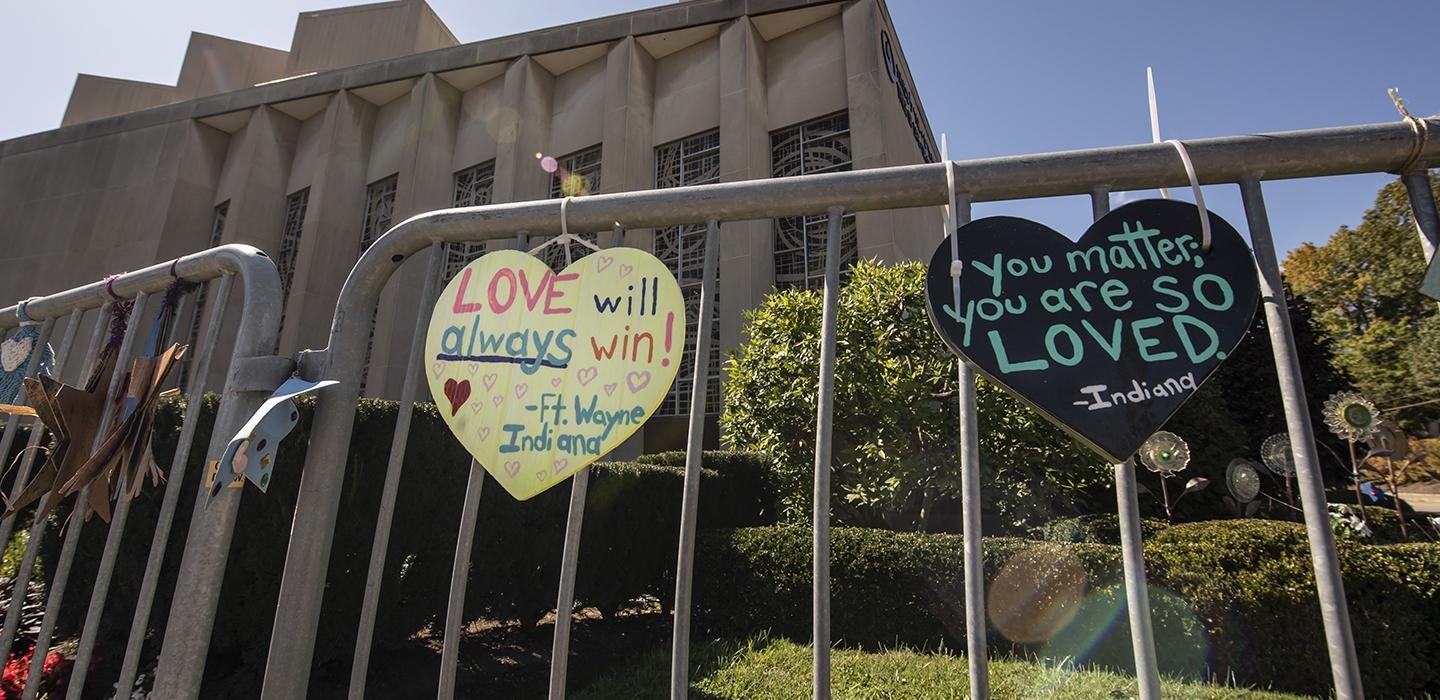
Subscribe to Pittwire Today
Get the most interesting and important stories from the University of Pittsburgh.Leaders in preventing extremist violence are meeting today in Pittsburgh for the inaugural Eradicate Hate Global Summit to share ideas and resources to prevent the spread of hate.
They’re gathering downtown just before the three-year anniversary of the Tree of Life massacre, when a gunman is accused of killing eleven congregants and wounding six others at the Squirrel Hill synagogue.
Public outpourings of grief, anger and calls for action to prevent future hate-motivated attacks followed — and organizers cite the tragedy as the impetus behind this symposium. Summit topics will include anti-Asian violence, COVID-19 as a breeding ground for extremism, and parallels between anti-Semitism in Nazi Germany and the present-day United States.
“Our mission is to honor the global victims of hate by breaking down silos, exchanging ideas, and engaging in prioritized actions against hate,” organizers said.
Sharing knowledge can lead to solutions
The summit, co-chaired by Chancellor Emeritus Pittsburgh Mark Nordenberg, who is also chair of Pitt’s Institute of Politics, features world-renowned keynote speakers, including Alejandro N. Mayorkas, secretary of the Department of Homeland Security; Alice Wairimu Nderitu, special adviser on the prevention of genocide for the United Nations; and Theodor Meron, president and judge of the International Residual Mechanism for Criminal Tribunals.
“The University of Pittsburgh community has been deeply involved in launching this summit,” Chancellor Patrick Gallagher said. “And we’ve convened an extraordinary mix of political leaders, activists, scholars and, of course, Pitt’s very own faculty members who are committed to driving meaningful conversations and necessary change on this important topic.”
Kathleen Blee — a distinguished professor of sociology and the Bailey Dean of the Kenneth P. Dietrich School of Arts and Sciences and the College of General Studies at the University of Pittsburgh — brings almost 40 years of experience studying hate movements to the summit. Much of her work is based on analysis of up-close ethnographic observations and interviews with white supremacists in the United States.
“If you look back 20 or 30 years ago white-supremacist ideology was marginalized and the people who sought that kind of propaganda had to look for it. Now it’s accelerating more quickly and broadly,” Blee said. “White-supremacist ideology is reaching vulnerable people, including very young children. We need to figure out a way to stop that acceleration.”
She is speaking on three panels: Gender and Violent Extremism; The Visualization of Hate; and Learning from Within: How the Lived Experience of Extremists Can Inform Solutions.
Nordenberg is moderating a panel, The Role of Tech In the Fight Against Hate and Extremism.
'A whole integrated process'
Blee also co-directs the Collaboratory Against Hate. Launched in partnership with Carnegie Mellon University in March 2021, the Collaboratory studies extremist hate that can lead to violent outcomes.
The goal of the Collaboratory is to bring together researchers and community members so they can understand the roots of extremist hate and develop effective interventions.
“We can only get so far by trying to combat aspects of extremist hate. Extremist hate is an integrated process that needs different research and intervention across a broad range of its manifestations,” Blee said.
Both the Collaboratory and the summit are working to make those interventions. “The summit is a good opportunity for us to showcase some of the Collaboratory’s work and to learn from others what work they would find useful for our researchers to be doing,” Blee said.
Conceived after planning for the summit commenced, the Collaboratory intends to host future conferences to continue the work of the Eradicate Hate Summit.
If you go
The Eradicate Hate Global Summit is being held Oct. 18-20, 2021, at The David L. Lawrence Convention Center downtown. Register to attend or stream events online. In-person attendees will need to show proof of full COVID-19 vaccination and wear a mask during the summit.
— Nichole Faina


